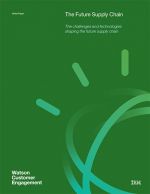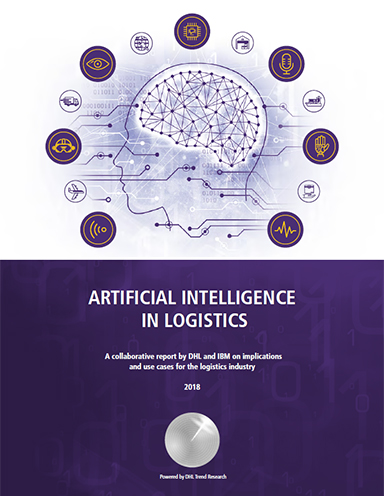Artificial Intelligence in Logistics
This 2018 paper is a collaborative report by DHL and IBM on implications and use cases for the logistics industry, it details how Artificial intelligence (AI) provides a huge opportunity as it leaps from consumer segments to enterprises and onward to the industrial sector and logistics.
Implications and Use Cases for the Logistics Industry
Today we find ourselves in another transformational era in human history.
Much like the agricultural and industrial revolutions before it, the digital revolution is redefining many aspects of modern life around the world. Artificial intelligence (AI) plays an increasingly central role in this transformation.
In recent years, AI has come roaring out of research laboratories to become ubiquitous and ambient in our personal lives, so much so that many consumers do not realize they use products and applications that contain AI on a daily basis.
AI stands to greatly benefit all industries, achieving adoption leaps from consumer segments to enterprises and onward to the industrial sector. Technological progress in the fields of big data, algorithmic development, connectivity, cloud computing and processing power have made the performance, accessibility, and costs of AI more favorable than ever before.
Just as the relational database found its way into core business operations around the world – providing better ways to store, retrieve, and organize information – AI is now following a similar path.
It is becoming an integral part of every future software system and soon we will no longer need to call it out as AI.
Already today, AI is prevalent in consumer-facing applications, clerical enterprise functions, online and offline retail, autonomous mobility, and intelligent manufacturing. Logistics is beginning its journey to become an AI-driven industry, but the future is still rife with challenges to overcome and opportunities to exploit.
With this in mind, experts from IBM and DHL have jointly written this report to help you answer the following key questions:
- What is AI, and what does it mean for my organization?
- What best practice examples from other industries can be applied to logistics?
- How can AI be used in logistics to reinvent back office, operational, and customer-facing activities?
Looking ahead, we believe AI has the potential to significantly augment current logistics activities from end to end. As in other industries, AI will fundamentally extend human efficiency in terms of reach, quality, and speed by eliminating mundane and routine work. This will allow logistics workforces to focus on more meaningful and impactful work.
What’s Related




Favorites





